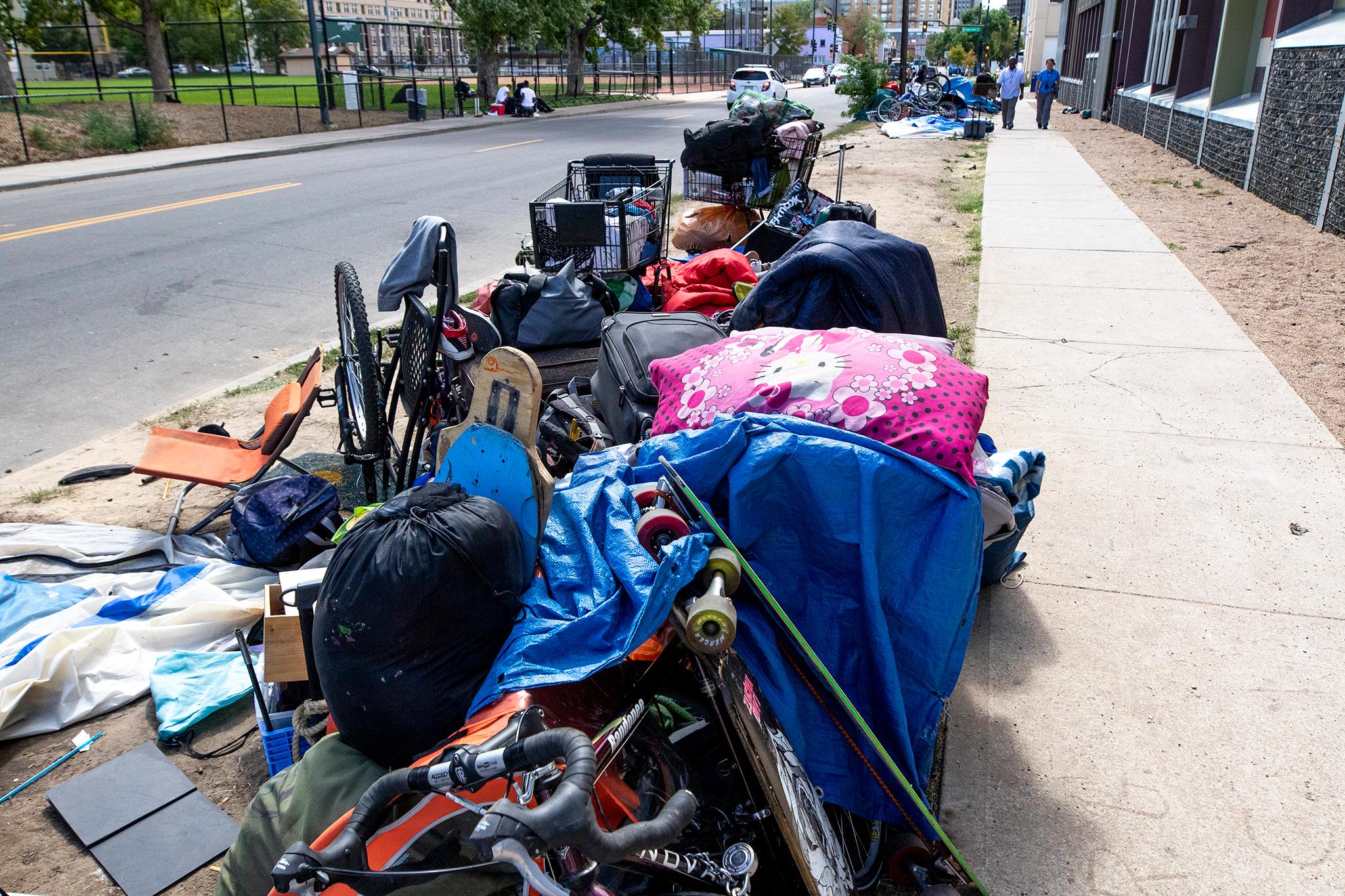A federal judge has signed off on a settlement under which the city will give notice before removing homeless encampments and take steps to improve conditions for people living on the streets.
In approving the agreement and ending the long-running class-action case, U.S. District Court Judge William Martinez said the city had pledged to do more than had been asked of it by people experiencing homelessness and their advocates who sued accusing Denver of violating the constitutional rights of urban campers. Martinez said the city had made an agreement that was "just, humane and which recognizes the dignity and the value of the homeless members of our community."
The reference to dignity earned a soft "amen" from one of a dozen or so people experiencing homelessness and their supporters who had come to the Alfred J. Arraj Courthouse for Monday's hearing. Cheers broke out after Martinez left and courtroom decorum no longer had to be observed.
The city has agreed to pay $5,000 to each of the six lead plaintiffs. The city also will give a week's written notice before clearing large-scale encampments; attach written notices to unattended personal property in areas it clears regularly and wait 48 hours before removing the items; and enact policies to ensure the return of property confiscated during clearances.
Fredrick Jackson, one of the lead plaintiffs, was in court Monday. Jackson said he had already received his $5,000 -- Martinez had earlier given preliminary approval and City Council had authorized the payments. The money has enabled Jackson and his older brother to stay in a hotel since June. The hotel is near a group home where a third brother lives, Jackson told Denverite after Monday's hearing.
In court documents, Jackson had described three occasions in which his belongings had been confiscated by city staff clearing encampments. Once he returned from a temporary job cleaning at a construction camp to find his sleeping bag, tent and other belongings had been taken. On another occasion, he was returning from trying to find permanent housing when he saw clean-up teams at work but was unable to stop them from taking his "sleeping bag, blankets, and my mountain bike that I used to get to work. It was blue. They took it and I could never get it back. I don't how the city is allowed to just take a person's bike."
Other elements of the settlement include requiring the city to provide public lockers and trash bins, portable toilets and places for needles to be discarded in parts of town frequented by people experiencing homelessness. A representative of the mayor and other city officials will hold quarterly meetings to hear from people in homelessness about whether the terms of the settlement are being upheld.
The city had looked for a vendor to create a mobile clinic that would treat people experiencing homelessness for free. No one responded to that request for service, so the city will do that itself, Assistant City Attorney Wendy Shea told Martinez during Monday's hearing.
The city also agreed to pay the plaintiffs' attorneys' fees, which amounts to admission its opponents prevailed in the case. While the judge said the $550,000 that lawyers Andy McNulty and Jason Flores-Williams had requested appeared fair, he asked the pair for more documentation before approving that part of the settlement. Included in the $550,000 is $30,000 for the advocacy group Denver Homeless Out Loud, which helped the attorneys reach people experiencing homelessness who were affected by the litigation.
The rest of the settlement goes into effect immediately. Shea told Martinez the city had last week posted a seven-day notice of an impending clean-up of an encampment along 21st Street between California and Stout streets.
"A lot of these procedures the city has had in place, but they're definitely better" as a result of the case, Shea said.
Judge Martinez praised McNulty and Flores-Williams, saying they had successfully advocated for people who "seldom if ever" have their voices heard in court.
Martinez said the plaintiffs were likely getting more than they would have had the case gone to trial.
"I think frankly that's the first time I've ever made that comment in a hearing of this type after nine years on the bench," Martinez said, adding people living in homelessness were having their concerns addressed much faster than the years it could have taken for a trial and appeals.
The city avoids a lengthy and costly trial, as well as the possibility of a judicial finding that its actions were unconstitutional. The case had begun with a group of homeless men suing over how city employees handled their belongings during a series of street clean-ups in 2016. The next year, Martinez granted it class-action status.
Assistant City Attorney Shea told Martinez during Monday's hearing that "everybody in this case is concerned about the well-being of people experiencing homelessness."
Homelessness "is a problem right now that doesn't have a solution. But hopefully we can work together to find some of these solutions."
Jackson, one of the plaintiffs in the case, said Monday that the solution was ensuring the poor had livable wages.
In court documents, Jackson said he had been homeless since 2013.
"I have worked at McDonalds. I have worked in the service industry. I have been a temp worker. I did not finish high school. I am trying to obtain my general equivalency, but without a high school diploma, I have found it almost impossible to survive in Denver with the rising costs of living. Rent is too expensive. Minimum wage is too low. No matter how hard I try, I can't get into housing."
After court Monday, Jackson said the problem was widespread.
"A lot of people are close to homelessness," he said. "The hotels are full. It's hard to get a room."













